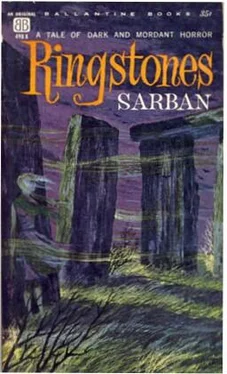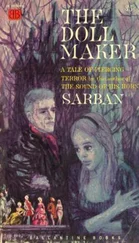Сарбан - Ringstones
Здесь есть возможность читать онлайн «Сарбан - Ringstones» весь текст электронной книги совершенно бесплатно (целиком полную версию без сокращений). В некоторых случаях можно слушать аудио, скачать через торрент в формате fb2 и присутствует краткое содержание. Жанр: Ужасы и Мистика, на английском языке. Описание произведения, (предисловие) а так же отзывы посетителей доступны на портале библиотеки ЛибКат.
- Название:Ringstones
- Автор:
- Жанр:
- Год:неизвестен
- ISBN:нет данных
- Рейтинг книги:3 / 5. Голосов: 1
-
Избранное:Добавить в избранное
- Отзывы:
-
Ваша оценка:
- 60
- 1
- 2
- 3
- 4
- 5
Ringstones: краткое содержание, описание и аннотация
Предлагаем к чтению аннотацию, описание, краткое содержание или предисловие (зависит от того, что написал сам автор книги «Ringstones»). Если вы не нашли необходимую информацию о книге — напишите в комментариях, мы постараемся отыскать её.
Ringstones — читать онлайн бесплатно полную книгу (весь текст) целиком
Ниже представлен текст книги, разбитый по страницам. Система сохранения места последней прочитанной страницы, позволяет с удобством читать онлайн бесплатно книгу «Ringstones», без необходимости каждый раз заново искать на чём Вы остановились. Поставьте закладку, и сможете в любой момент перейти на страницу, на которой закончили чтение.
Интервал:
Закладка:
Most of the doorways round the yard gaped open. I wandered round and poked my head into a few of them. All were empty and smelt damply of long disuse. The roofs of some of the places had fallen in, but on the ridge of the block facing the gates there were still the remains of a wooden lantern with a bit of iron−work on the top of it which had once, perhaps, supported a weather vane. I paused in my tour of the yard at one corner to fill my pipe, looking idly into a bigger place with a double doorway which seemed to have been a coach−house. I stepped inside to strike a match, and, with half an eye, as I attended to the lighting of my tobacco, I noticed that the place still contained some mouldering vehicular rubbish leaning against the walls, while odds and ends of rotting leather harness and bits of old iron were strewn about the floor. There seemed to be some sort of wide old fireplace on one side. Piers, who had followed me and gone further into the place, poked about among the rubbish while the light of my match lasted.
“Two things at any rate,” I said, as we walked back to the Hall again, “emerge from this reconnaissance. One is that we shall have to be content with our sandwiches for lunch, and the other is that we shall have to look elsewhere for your friend. Do you want to explore this place any more, or shall we have a shot at getting to Blagill before the pub shuts?”
He shook his head. He seemed quite satisfied, and in fact wore an air now of having expected the place to be like that. “There isn't a pub at Blagill,” he said. “At least, there's none marked on the map.”
He pulled the map out and thought for a time. I was a little puzzled by his manner then, but supposed that he was working out a new theory to account for Daphne Hazel's story in the fight of our discovery. I myself couldn't see what problem he could possibly find now in Daphne's bit of fiction, but, of course, we looked at the thing from different points of view.
“The quickest way back to Staineshead,” he said, “would be to strike straight over this hill and drop down into the road on the other side. We could go to Blagill and trust to getting a bus, but I don't know how they run, and the main thing now is to find Daphne as soon as we can.”
“Dammit,” said I, “we're out for a walk. Not, mark you, that I don't think it would be quicker to stick to the footpath than to take one of your short cuts, but I'm not convinced of the urgency, anyway.”
We crossed the park, Piers pointing out with rather a defensive air, as we approached the stream on the other side, that you could, with a little imagination, discern a kind of circular drive or track round the level space. We crossed the beck on the rocks and pushed through the marshy thickets of birch and willow on the other side, then tackled the steep hill.
Once we had got through the close and cobwebby plantations of conifers we stopped, sweating freely, beside a trickle of clear water and ate our sandwiches. After that it was a toilsome way up the moor. The sheep paths were not much use to us as they all ran horizontally, so we lugged ourselves slowly upwards through the tangle of bracken and heath, and finally reached the saddle in the ridge which we had seen from the Stone Circle. I say ridge, but it is a broad, more or less level mountain top, and, of course, most of it is bog and moss. It was very slow progress we made, but we kept advancing in a general Easterly direction, bearing, if anything, away to our left. It took us nearly as long to get over that hill as it had done to come from Staineshead to Ringstones by the path. But, of course, we couldn't have dreamed of going back by the same way we had come.
When, in the end, we got down on the other side and squelched in our sodden boots upon the metalled road we made up for lost time, and did a steady march of four miles an hour all the way to Staineshead. The bus from Blagill overtook us just as we came to the first houses of Staineshead.
Piers's idea was to go to the Post Office and begin his enquiries after Miss Hazel there. I agreed, but persuaded him to call at the principal pub in the place, the White Bear, and see if we could do something about our night's lodging. To my surprise, but not at all to his, they made no difficulty about giving us a room at a moderate price. We asked the landlady if she knew anything of Miss Hazel, but drew blank; however, she directed us to the Post Office.
I was wondering whether I dare propose to Piers that the investigation be postponed until we had had some tea, when our quest ended before it had well begun. Staineshead is not a big place, but still, the encounter was a stroke of luck. Half−way down the main street Piers suddenly exclaimed, “Hallo!” and darted off to the other side of the road. There, looking into a general store window, was a tall, fair−haired girl in a belted green frock, bare−headed, bare−armed, with a little boy holding one of her hands and industriously kicking out the toe of his shoe against stones of the shop−front.
Piers and the girl had already greeted one another before I came across to them, and were launched on half−embarrassed, half−laughing explanations, which were interrupted and made still more confused by my introduction, and then broken off altogether by our being joined by a middle−aged woman who came out of the shop accompanied by two olive−skinned, foreign−looking little girls of twelve and fourteen or so. We stood in a knot on the pavement and everybody talked at once, including the little boy, whose theme was simply and insistently tea. However, it emerged that the middle−aged lady was Mrs. Hancock, that she was Daphne's temporary employer, that little Bobby was her son and the two girls children of a friend staying with the Hancocks for the school holidays.
While Piers did most of the talking on our side, I, naturally, observed Daphne Hazel, the quarry, so to speak, of our wild−goose chase. She was very much the pleasant, active−looking girl I had pictured; just the girl who would have enjoyed such energetic gambols as she had described. Still, what struck me, and what couldn't well have been described in her first−person story, was her good looks. I admired in particular a most attractive combination of natural tones: a shining softness of pale hair, an intense blue of the eyes and a clarity of complexion where the blood brightened the light−brown tan of summer. That she recognised the satisfying harmony of those colours herself was indicated, I thought, by her having refrained from intruding on them any smear of synthetic carmine.
Mrs. Hancock made the amiable suggestion that we should go back with them for tea, so off we went on foot The house, it appeared, was not far out of the town. Piers and Daphne and the little boy walked in front and Mrs. Hancock and the two little girls and I followed on their heels. I was giving Mrs. Hancock a rather cautious account of our walk.
“Oh, Ringstones Hall!” she said. “Daphne and my husband can tell you a story about Ringstones Hall!”
I hesitated to ask what, because I was not sure how much she knew about Daphne's story, but then, from what Daphne was saying to Piers, I grasped that there wasn't much secret about it.
Daphne's voice expressed great surprise. “But didn't you get my letter?”
“No,” said Piers. “There was no letter.”
“But I wrote,” she protested, “and explained it all. I sent the letter off first, because I remember thinking when I was wrapping up the book, how silly—because I could have put the letter inside the book and saved twopence ha'penny. But I'd written the letter first and I licked the envelope and put the stamp on and gave it to Bobby to post without thinking.''
She stopped suddenly and we all stopped. She looked at Bobby, a child, I suppose, of some nine or ten years, with consternation in her face.
Читать дальшеИнтервал:
Закладка:
Похожие книги на «Ringstones»
Представляем Вашему вниманию похожие книги на «Ringstones» списком для выбора. Мы отобрали схожую по названию и смыслу литературу в надежде предоставить читателям больше вариантов отыскать новые, интересные, ещё непрочитанные произведения.
Обсуждение, отзывы о книге «Ringstones» и просто собственные мнения читателей. Оставьте ваши комментарии, напишите, что Вы думаете о произведении, его смысле или главных героях. Укажите что конкретно понравилось, а что нет, и почему Вы так считаете.



